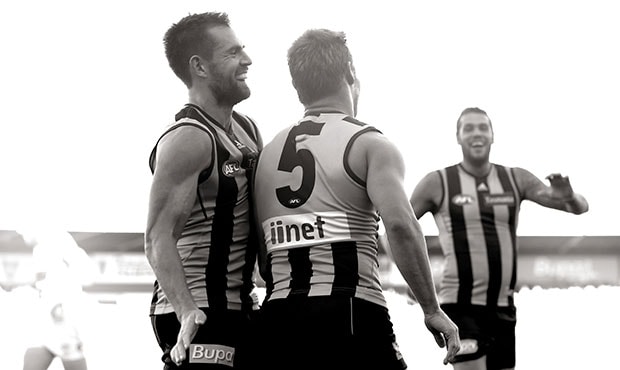HOW DID a short, stumpy kid from Mooroolbark, twice rejected at the National Draft, become one of the greatest midfielders of the modern era? ASHLEY BROWNE talks to some of those who shared Sam Mitchell’s journey from the start as he celebrates his 300th game this weekend.
Donald McDonald (Box Hill coach, 2001): The first time we saw him was when he was playing at the Eastern Ranges, which was a feeder club for Box Hill. One of our assistant coaches was Greg Rowe and he knew Sam through working with him at under-16 and under-18 level. We were watching a final at the MCG and I saw this player with blond hair. I said to Greg, ‘We won’t be getting him,’ but Greg said the recruiters all thought he was too slow, so we still might get him after all.
Luke Hodge (Geelong Falcons midfielder, 2000): At that level, you only tend to worry about your own game, so I don’t remember much about playing against him other than the TAC Cup Grand Final when he clotheslined Amon Buchanan and got sent off for 15 minutes. I think the game swung our way when he was off the ground.
Sam Mitchell and Luke Hodge after Hawthorn's 2013 premiership win. Picture: David Callow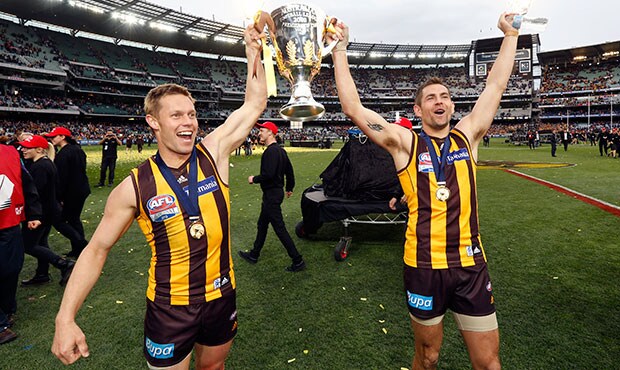
Mitchell won the Ranges' best and fairest in 1999 and 2000. But after being passed over twice at the draft, he headed down the road to Box Hill.
McDonald: He was devastated not to be drafted, but to his credit he came to Box Hill and worked on things.
Peter Schwab (Hawthorn coach, 2001): I reckon the first time I saw him was probably in the Box Hill seconds. He was just a small, dumpy blond-haired kid running around who kept getting the footy. Donald said he was going to promote this kid to the firsts and I said OK. He just went from there and every time I went to watch him play he kept accumulating the ball and finding a way to use it.
McDonald: His second half of the year was just fantastic and he was best-on-ground in the Grand Final.
The Hawks held the first pick at the 2001 National Draft, having traded the popular Trent Croad to Fremantle in order to select Hodge. But they also held picks 16, 20, 32, 36 and 48. Schwab needed some convincing to select Mitchell, particularly given they picked a similar sort of player, Daniel Elstone, at No.20.
Schwab: Daniel was an inside hard-nut who could win the ball. So when we took him, I thought about whether we needed to take Sam. But Donald was a great supporter of him and coming up to that pick he thought he was worth taking.
Hawthorn premiership captain and coach David Parkin was back at the club as director of football after many years away and had also taken a shine to Mitchell.
David Parkin (director of football, 2001): I was a slow learner. I twice got rid of Greg Williams (1981 and 1982) when I was at Carlton because he was too fat and too slow. When I watched Mitchell at Box Hill, he was a clone of 'Diesel'. It was uncanny for me and he was doing things on the footy field that can’t be taught. I couldn’t think of two more alike players.
John Turnbull (Hawthorn recruiting manager, 2001): There was still significant debate, even at the draft. I wanted to leave him for the last pick we had, which was No. 48. I had been checking with 'Mitch' daily in the lead-up to see whether any clubs had made contact with him and I was confident we could get him with that final pick. I wanted to go for Leigh Montagna and get Mitch later. But the weak bastard I was, I succumbed to David Parkin.
Parkin: Donald rang me and said 'Schwabby's' not that keen. Eventually he got irritated with Donald and I and said to pick him.
Schwab: I told 'JT', 'Take the kid mate. He's the best kid there at that pick. Don't worry about the size or we have another player (Elstone), just take him.'
Turnbull: We got him at 36 and Montagna went at 37.
Parkin: The lovely part of this story is after they won the flag in 2008, I got a phone call not long after the game and it was Sam wanting to thank me for having the faith and giving him a chance. I told him that it wasn’t me, it was Donald and that he should get off the phone and give him a call instead. 'Don’t worry,' he told me. 'I rang him before I rang you.'
Mitchell and Shane Crawford enjoy the 2008 AFL Grand Final presentation. Picture: AFL Media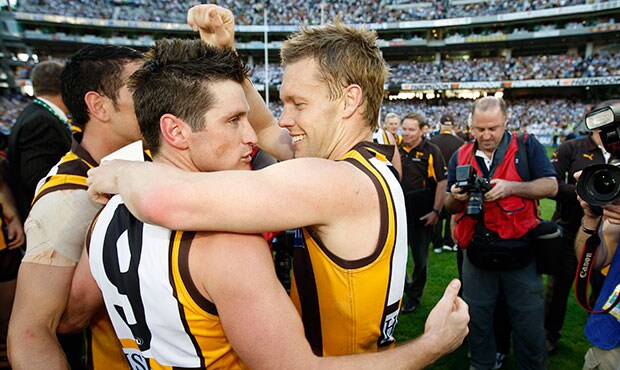
The professionalism, hunger and drive for which Mitchell has become renowned, was evident from his first summer at Hawthorn where he shadowed Shane Crawford everywhere in a bid to improve his running capacity.
Parkin: I told him that he played the game and read the game beautifully, but he had a very ordinary level of fitness. He didn’t argue, which was unusual for Sam because he’s very argumentative if he doesn’t agree with you. I said the two best-prepared players I had ever seen were Craig Bradley and Shane Crawford. You’re with ‘Crawf’, so latch on to him and do everything he does, and more. And he did.
McDonald: Sam had this unbelievable self-belief and determination.
Hodge: Because he had a few knockbacks and didn’t get drafted, he would do everything he could to improve and there was no better player to follow than Crawf whose preparation and training was second to none. A lot of that rubbed off on him.
McDonald: Shane got Sam’s running levels up to AFL standards.
Schwab: He was a great learner from the start. He was a very determined and focused kid. He linked in to Crawf straight away and followed his every move. And then he also hounded (fitness coach) Bohdan Babijczuk. This was not a negative at all, but if there was anyone who could help him better his game, then Sam would seek them out.
One of those was Williams, in a get-together arranged by Parkin.
Parkin: Greg wasn’t the best teacher or communicator, but one of the things he said was, ‘Stop when you want to buy some time. Stand still. Your opponents will stand still, too.’ It was one of the great teaching moments. You watch. Instead of tackling him, they stand still to see what his next action will be, which gives him the time to make a better decision. They were so alike.
Crawford with Greg Williams at the launch of the 2013 Toyota AFL Finals Series. Picture: Darrian Traynor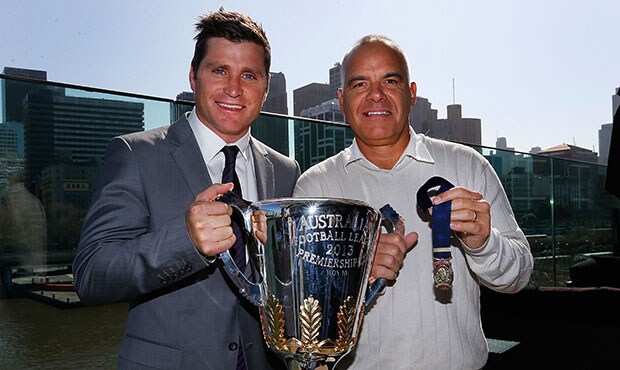
The expectations were on Hodge from the start as the No.1 pick, but it was taken as fact that he could play. Mitchell had to prove himself.
Hodge: I wouldn’t say he had a chip on his shoulder, but there was this competitive drive. If you said ‘no’ to Mitch, he wouldn’t take it. He’d say, ‘Don’t give me a no, tell me how I can get better’. Even now, he’s like a first-year player the way he runs around.
Schwab: Players become champions not just because they have talent, but also because they work harder than anyone else. And that was the case with Sam.
Turnbull: He just got on with it when he came to Hawthorn. He just wanted to play and then the weight of numbers started to show. We’d look at the stats from the VFL and he was just dominant. He then proved it by winning the Liston Trophy.
Mitchell reflecting on a loss against Richmond in 2004. Picture: AFL Media 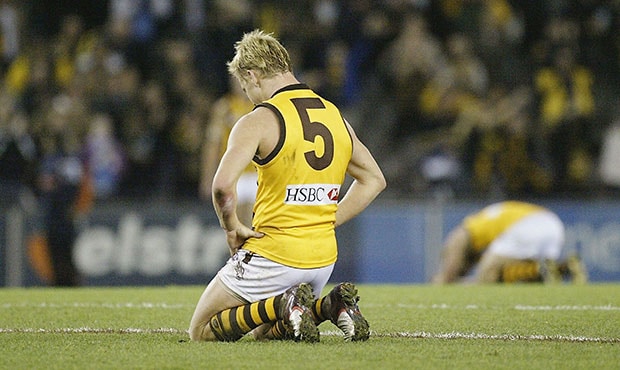
Mitchell played nine AFL games in 2002, his first season on the list. But it was a remarkable year because he also played 11 games for Box Hill, mainly in the first half of the season and was voted best-on-field 10 times. He polled 31 votes to win the Liston Trophy for the VFL best and fairest by 12 votes. He had the medal sewn up by round 16. The following year he won the NAB AFL Rising Star award. It was just the beginning.
Turnbull: A week after the season, I bumped into he and (former ruckman) Robbie Campbell at Glenferrie Oval. They were both covered in lycra and about to ride their bikes to Rutherglen (305km away in country Victoria). He wanted to take his fitness to the next level.
Parkin: A couple of years later, it was December 21, there was a knock on my door. It was Sam with a big grin on his face. He said ‘I beat Crawf in the pre-season time-trial’. I gave him a hug and told him how fantastic it was. But then he added, ‘Lance Franklin beat us both’.
Mitchell celebrating with his parents after winning the 2003 NAB AFL Rising Star award. Picture: AFL Media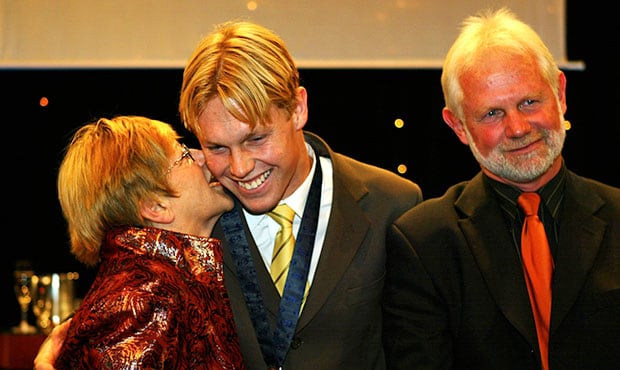
Mitchell has done it all in football since. Multiple premierships, best and fairests and All Australian jumpers, a stack of media awards and the respect and admiration of pretty much everyone in the game. Those who were there at the start have taken pride in all that he has achieved since.
McDonald: You look at that 2008 (premiership) team, it had eight or nine guys who all came through Box Hill and were all genuine competitors, just like Alastair Clarkson. They’re the guys you need to win a premiership.
Parkin: I’m biased, but it has got to the stage where he is doing things that no other player can do, including Williams. He has gone to another level with his decision-making and his ability to get the game going. There are very few players who I have played or watched who can influence a game like Sam.
Schwab: It’s a combination of everything, but the one thing he has always been able to do is win the ball consistently in contested situations, and he’s a marvellous decision-maker and user of the ball.
Hodge: Teams target him. The harder they tag him, the more tough and courageous he becomes and the more he puts his head over the ball. He cops a battering every week and he’s the first player to get up.
Mitchell with his fellow four-time premiership teammates last year. Picture: Michael Dodge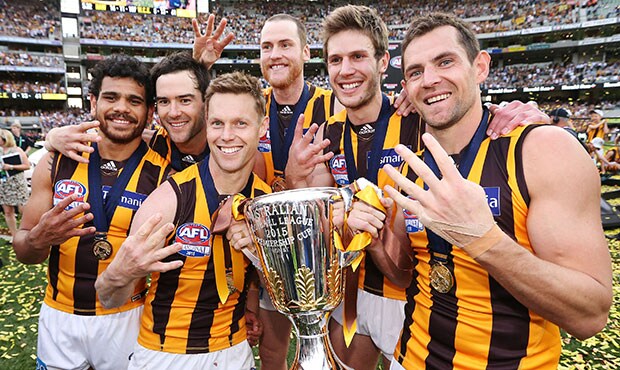
McDonald: He leads by example. You have to respect him for his work ethic and hardness at the footy. They’re the traits that every footballer would respect. I wish he played for North Melbourne (McDonald is a senior executive with the Kangaroos).
Parkin: His desire to learn about the game is unsurpassed. I would choose him straight away to come and assist me if I was building a coaching staff for a football club. I’d be getting him in if I could because he’s the best thinking player I’ve seen. He uses every moment as a learning opportunity.
Schwab: He’s a champion. I’d rank him in my top five all-time Hawthorn players. He’s just a phenomenal player to have done what he has for so long and so consistently.
Hodge: He’s still like an eight-year-old. Normally it’s the young kids with all the energy and excitement, but he still acts like that with his enthusiasm and passion for the game. That’s his best attribute. He’s 33 now and he still wants to get better. Every day at the club he has a plan to get better at one part of his game. That’s got nothing to do with luck or talent. There’s no better person to follow.
Mitchell, Hodge and former Hawk Lance Franklin celebrate a win. Picture: Michael Wilson